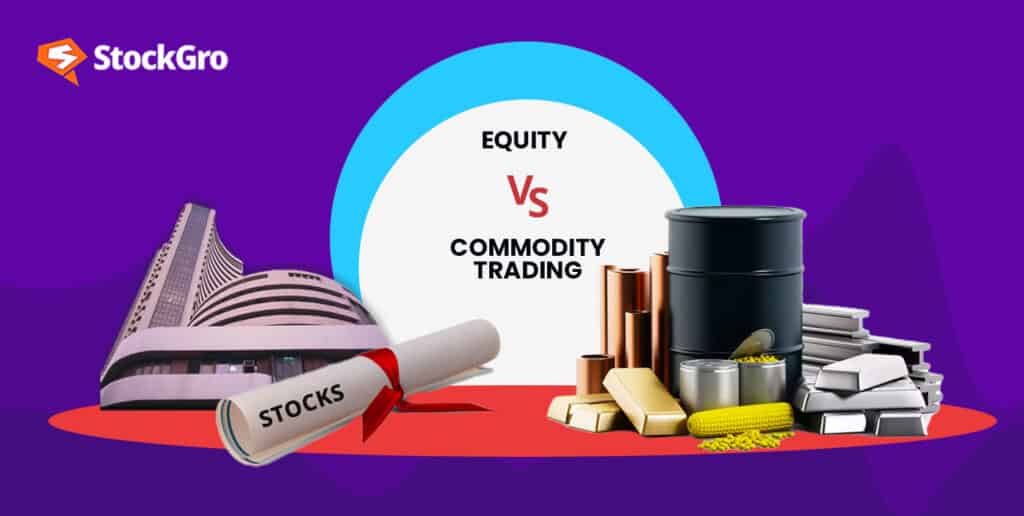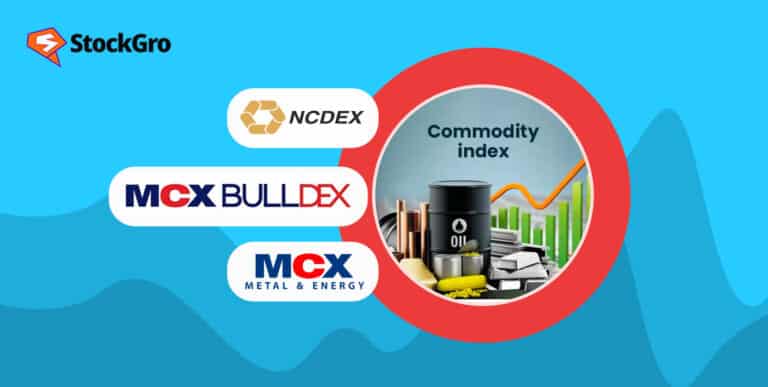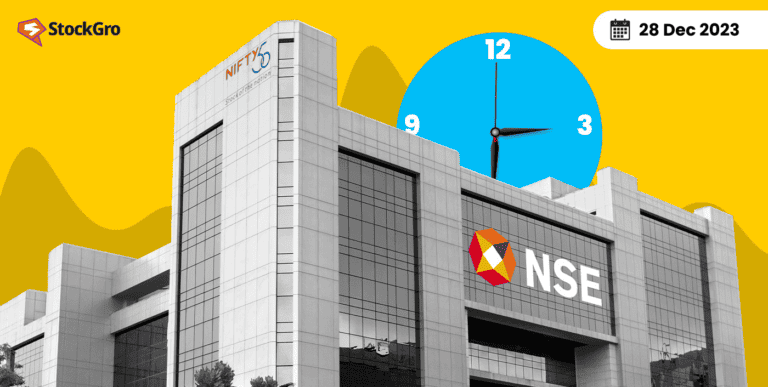
Investing is crucial in growing your wealth and ensuring your financial future is safe and sound. When you think about investing, there are different types of things you can invest in, and two of the big ones are stocks (which means you own a piece of a company) and commodities (these are actual things you can touch, like gold or oil). So, it’s like deciding whether you want to be a part-owner in a business or own something real, like a shiny gold bar or a barrel of oil.
In this blog, we will delve into the key differences between equity vs commodity investments, exploring each of their characteristics, advantages, and drawbacks, to help you make informed decisions in your investment journey.
What are equity investments?
When you buy shares of a company’s stock, you become an owner of the company. Equity also known as shares or stock are traded on stock exchanges like the NSE or BSE, where the prices change based on demand and supply of that share. Here’s a closer look at the characteristics of equity vs commodity investments.
Characteristics of equity investments
Ownership
When you invest in equities, you buy a piece of the company. Your ownership stake can give rights, such as voting at shareholder meetings and receiving dividends (a portion of the company’s profits).
Volatility
Equities can be highly volatile, with their prices influenced by factors like economic conditions, company performance, and market sentiment. Volatility leads to both heavy gains and losses.
Long-term growth
Throughout history, equities have consistently showcased the ability to appreciate over extended periods. Numerous investors choose to retain their stock holdings for many years, and sometimes even decades, enabling their investments to steadily increase in worth over time.
Also read: What is spot market?
Advantages of Equity Investments
- Equities possess the capacity to yield substantial returns over extended periods, surpassing the impact of inflation and outperforming various other asset categories.
- Stocks typically exhibit high liquidity, enabling investors to readily purchase or sell them on the stock market, granting them a degree of flexibility in their investment strategy.
- Numerous corporations allocate a share of their earnings as dividends to their shareholders, offering investors a consistent source of income.
Drawbacks of Equity Investments
- The volatility that leads to high profits can also result in higher losses. Stock prices are heavily influenced by speculation and big trades made by institutions.
- Shareholders have low or zero control over a company’s operations and decision-making.
What are commodity investments?
Commodity investments involve buying and holding physical goods or investing in financial instruments linked to the prices of commodities. Commodities are categorised into two groups: hard commodities (tangible goods like gold, oil, and agricultural products) and soft commodities (coffee, sugar, and cotton to name a few). Here’s how equity vs commodity investments differ in terms of characteristics.
Characteristics of commodity investments
Tangibility
A key characteristic of commodity investments lies in its association with tangible assets. To illustrate, when you invest in gold, you possess actual physical gold bullion.
Price sensitivity
Weather conditions and geopolitical tensions affect the prices of commodities.
Diversification
Incorporating commodities into an investment portfolio is a strategy for achieving diversification. Frequently, these assets exhibit low correlation with conventional investment categories such as equities and fixed-income securities. This lack of correlation suggests that commodities can potentially serve as a protective measure against fluctuations in the stock market.
Advantages of commodity investments
- Including commodities in your portfolio can help reduce risk through diversification, especially during times of economic uncertainty.
- Commodities serve as a hedge against inflation.
- Investing in assets like gold or real estate can provide security and ownership.
Drawbacks of commodity investments
- Commodities cannot provide income from dividends. Investors rely on price movements to gain from commodity investments.
- Investing in physical commodities may involve storage costs, especially for items like gold or oil. These costs can eat into your returns.
Commodity Trading vs Equity Trading
| Basis | Commodity | Equity |
| Trading Hours | They remain open from 9:30 am to 6:30 pm | They operate between 9:30 am to 3:30 pm |
| Purpose of holding the security | Short-term trading strategies are primarily employed for hedging purposes, aiming to minimise potential losses or capitalise on rapid profit opportunities rooted in speculative predictions. | These investments primarily focus on the long term, to acquire ownership and a share of profits in an emerging or expanding business, ensuring sustained returns over an extended period. |
| Trading instruments | Commodity trades are taken primarily through derivative contracts like futures, options and forward contracts | Equity trading can be done by derivative contracts as well as investments through stock delivery. |
| Expiry of these investments | Commodities are primarily exchanged through contractual agreements. These contracts derive their value from future price expectations for a specific period, after which they reach their expiration date and become devoid of value. | Equity remains listed on stock exchanges for extended periods. The companies experience economic cycles of growth and downturns. Their stocks typically remain listed on the exchange throughout these fluctuations. |
| Examples | Sugar, corn, wheat, minerals, gold, silver | Shares of companies like Reliance Ltd, and HDFC Bank Ltd. |
Also read: Commodity swap: Meaning & how it works?
Bottomline : Equity vs Commodity
In conclusion, the choice between equity vs commodity investments depends on factors like your goals, risk tolerance, and time horizon. Equity offers ownership, growth potential, and dividends but comes with stock market volatility. Commodities, like gold and oil, provide diversification and inflation protection but are sensitive to price fluctuations.
Equity investments remain listed on stock exchanges for the long term, while commodity contracts have expiration dates. Both have their advantages and drawbacks. Diversification through a mix of both can help manage risk in your portfolio. Consulting a financial advisor is vital for informed investment decisions.

